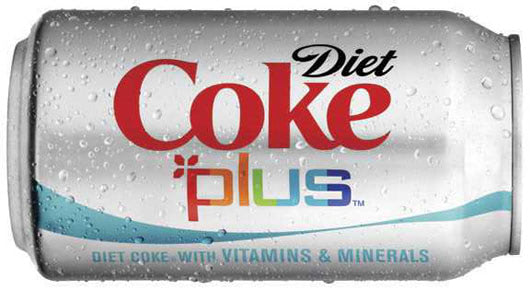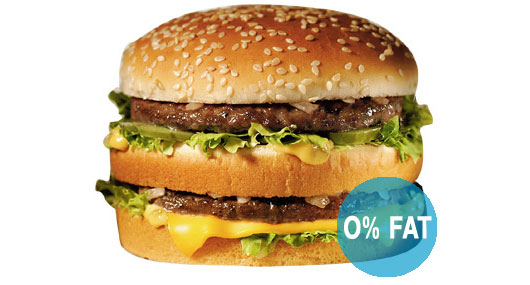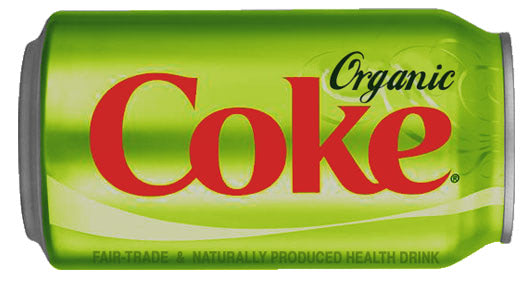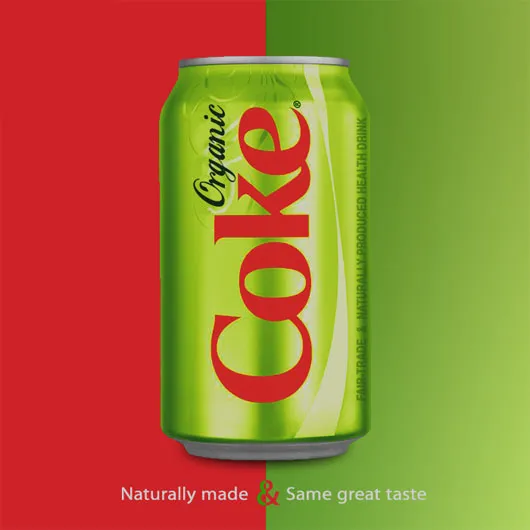Whoever you are, whatever you do, wherever you may be. You can’t beat the real thing. It really refreshes and brings real satisfaction in every glass. It was not until America’s choice had been thirst best friend for decades and consumed by millions every day, when a serious drawback arose: the real thing makes you really fat.
by KOERT VAN MENSVOORT
In 1982 the Coca Cola Company addressed the negative aspect of its drink with the introduction of a sugar-free version of the Ice-cold sunshine. Diet Coke was the first new coke brand since 1886 and signified a revolution – not only for wannabe thin women – but for the Coca Cola brand as a whole. Numerous coke by-products followed in the slipstream of the Diet Coke success: Cherry Coke, Caffeine-Free Coke, Classic Coke, Vanilla Coke, Coca-Cola Orange, Coke Zero, Coke Black Cherry Vanilla and many more. Today these spinoffs have saturated the market up to a level that we can safely say nobody drinks the real thing anymore.

End of story? Not really, evolution always continues. The latest addition to Coca Cola product range could mean a new revolution in fast-food: Diet Coke Plus not only reduces calories or ads a flavor, it actually improves your health. Diet Coke Plus is fortified with vitamins and minerals. One can already provides 25% of the daily value for niacin and vitamins B6 and B12, and 15% for zinc and magnesium, so if you drink four cans a day, you’ve got your it all covered; Diet Coke Plus: better than the real thing!

The general tendency here is that fast-food is remarketing itself into health-food. My guess is soon we will be eating burgers, fries, shakes, ice-cream and chips that are engineered to make us healthy. Although this may sounds like hedonistic utopia, it also has an uncanny side to it. After all, we humans have evolved with a powerful ability to ‘taste’ whether food is good or bad. When we were roaming the savanna 40.000 years ago, you could easily taste that those bitter berries were probably poisonous. But as food science progresses the ability to taste whether food is healthy becomes obsolete, or at least gets numbed. Nowadays we need long lists of nutrition facts on food packages in order to make sense of what we eat and then some of the important information isn’t even on the package, because our scientists simply don’t have the right knowledge (yet).
The sweetening ingredient in Diet Coke, a substance called aspartame, has already been blamed by some scientists for possibly causing serious illnesses (such as cancer, brain tumors, brain lesions, and lymphoma) when consumed in large quantities. Though many studies are available that state aspartame is perfectly safe, the controversy has reached enough lever for Coca Cola to release ‘Diet Coke Sweetened with Splenda’, a coke that instead of aspartame contains sucralose and acesulfame potassium, whatever that may be.

Thus, while engineering might make food healthier, it also makes food more abstract. And abstraction is not something people generally appreciate, whether it is in language, music, painting, or food. No surprise that people, who can afford it, move away from engineered food, packed with abstract chemicals and meta-substances, towards the so-called organic food, which can be more or less classified as ‘food produced in the way your grandparents produced their food’.
Historically, the organic farms have been relatively small family-run farms — which is why the retro-food was once only available in small stores or farmers' markets. However, since the early 1990s organic food has had growth rates of around 20% a year, far ahead of the rest of the food industry. With the market share of organic food outpacing much of the food industry, many big corporations have moved into the market of retro-food production.
Now let’s get back to Diet Coke Plus. I am not sure whether the people of the Coca Cola Company realize it themselves, but with Diet Coke Plus they are in fact returning to their roots. Late 19th century when Coca-Cola was invented by John Pemberton, he intended it as a patent medicine — similar to the cough syrups we still know today. Few people live to remember early marketing slogans like “For headache and exhaustion, drink Coca-Cola” (1900) and “Coca-Cola is a delightful, palatable, healthful beverage“ (1904) which clearly indicate Coca Cola was originally marketed as a health drink. It was only after the salesmen realized that people didn’t want to drink a ‘medicine’ on a daily basis, they decided to let go of this original image in order to increase consumption and marketing share.
So for over a hundred years, while we thought we were always drinking the real thing, we were in fact consuming a spin-of version of the original health drink; a Fake! Only with this historical information one realizes the new Diet Coke Plus health drink might just be the most original coke produced in our lifetime. As I see it, Coca Cola Company is moving in an interesting direction with Diet Coke Plus, but they still have to push further in order to truly return to their origins. In their upcoming Coke product they should drop all the chemically engineered additives and produce a truly authentic old fashioned soft drink. After Diet Coke, Cherry Coke, Classic Coke, Coke Zero, Diet Coke Plus and Coke Splenda, I want my Organic Coke! Because you can’t beat the original thing.



Comments (0)
Share your thoughts and join the technology debate!
No comments yet
Be the first to share your thoughts!